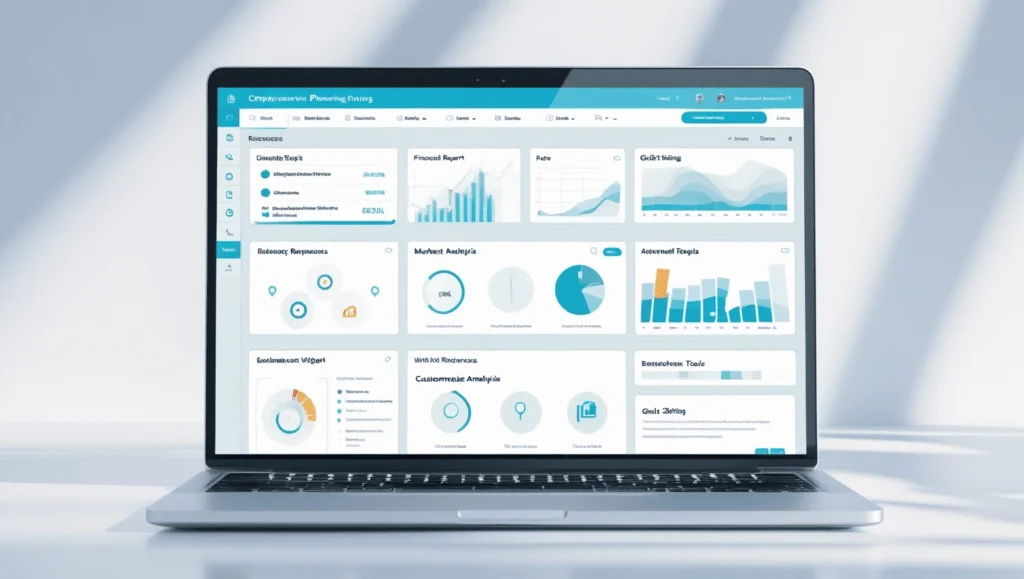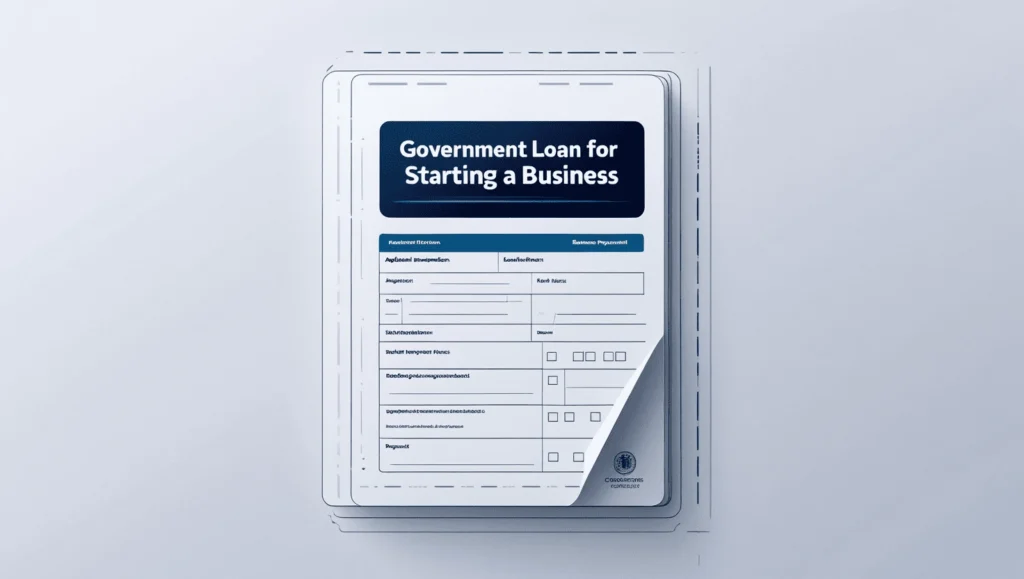Starting a business with bad credit may feel challenging, but it’s not impossible. Government loans to start a business with bad credit provide a practical solution for aspiring entrepreneurs. These loans are backed by the government, offering a lifeline for those who may not qualify for traditional financing. Understanding your options, eligibility requirements, and the application process is essential for success. This article will guide you through the key steps, offer tips for securing funding, and provide helpful resources to turn your business dreams into reality. For more details, visit the Small Business Administration website.
1. What are Government-Backed Loans?
Government-backed loans are financial products supported by government programs to help individuals and businesses access funding, especially those who may struggle to secure traditional financing. These loans are often a lifeline for small business owners, entrepreneurs, and individuals with less-than-perfect credit.
Supporting Small Businesses
One of the primary purposes of government-backed loans is to support small businesses and startups. Entrepreneurs who might not qualify for traditional loans due to credit challenges or lack of collateral can turn to these programs for assistance. Government guarantees make lenders more willing to extend credit, even in cases of higher risk.
Key Benefits of Government-Backed Loans
1. Lenient Credit Requirements
Compared to loans from traditional banks, government-backed loans often have more flexible credit score requirements. This makes them an excellent option for individuals seeking government loans to start a business with bad credit.
2. Lower Interest Rates
These loans typically come with lower interest rates. The government guarantee reduces the lender’s risk, allowing them to offer more favorable terms.
3. Access to Resources and Mentorship
Borrowers can benefit from additional resources through government agencies. Many programs provide mentorship opportunities, business planning assistance, and educational tools to help entrepreneurs succeed.
For example, programs like the Small Business Administration (SBA) not only provide funding but also offer guidance to help businesses thrive. To learn more, visit the U.S. Small Business Administration website.
2. Who Should Consider Government-Backed Loans?
If you’re starting a business and have concerns about your credit score, government loans to start a business with bad credit can provide a pathway to funding. They are ideal for individuals looking to grow their business while keeping borrowing costs manageable.
Explore options like SBA loans, USDA business loans, or state-specific programs tailored to small business needs. These programs not only offer financing but also contribute to building a strong foundation for long-term success.
Government Agencies Offering Loans
When looking for loans to start or grow your business, several government agencies offer a range of programs designed to assist. These programs cater to different needs, from rural development to general small business support. Understanding these resources can help entrepreneurs secure the necessary funding for their ventures.
Small Business Administration (SBA)
The Small Business Administration (SBA) is one of the most well-known sources of government loans. The SBA offers a wide variety of loan programs to support small businesses, whether they are just starting out or looking to expand. One of the SBA’s key offerings is the 7(a) loan program, which provides funding for a range of business needs, including working capital, equipment, and real estate. In addition, the SBA also offers microloans, disaster loans, and export loans. These programs are designed to make it easier for small businesses to access financing, even if they have less-than-perfect credit.
For those specifically interested in government loans to start a business with bad credit, the SBA’s loan options can provide a pathway to success. Their microloan program, for example, is often easier to qualify for and may be a good option for business owners with poor credit. These loans can be used for working capital, inventory, and other essential business expenses. By working with the SBA, small business owners can receive the guidance and support they need to navigate the loan process.
U.S. Department of Agriculture (USDA)
For businesses located in rural areas or those focused on agriculture, the U.S. Department of Agriculture (USDA) offers specialized loan programs. The USDA provides financial assistance to businesses involved in agricultural production, processing, and related services. Their loan programs aim to foster rural development and create jobs in communities that might otherwise struggle to access financing.
The USDA’s Business and Industry Loan Program (B&I) is a key resource. It offers loans to rural businesses for various purposes, including land acquisition, equipment purchases, and working capital. These loans typically have favorable terms and lower interest rates compared to conventional loans, making them an attractive option for rural entrepreneurs. Additionally, the USDA’s Rural Development program offers grants and loan guarantees to support businesses in underserved areas.
Other Agencies Offering Niche Programs
Beyond the SBA and USDA, other government agencies also provide loans and grants for specific industries and needs. The U.S. Department of Commerce, for instance, offers financial assistance through its Economic Development Administration (EDA) for businesses engaged in regional economic development. Additionally, the U.S. Department of Energy provides funding for businesses that focus on clean energy and sustainability initiatives. These niche programs can be incredibly beneficial for entrepreneurs in specialized fields.
Exploring the various loan options available through these agencies can help you identify the best fit for your business. Many of these programs have specific eligibility requirements, but they can provide invaluable support for your business’s growth and success.
In conclusion, government agencies like the SBA and USDA offer crucial resources to help small business owners secure financing. Whether you’re starting a business in a rural area, launching a startup with bad credit, or seeking funding for specific industries, these programs can provide the assistance you need. By tapping into these government loans, you can access the necessary capital to start or grow your business with confidence.
For more information on government loans and financial assistance programs, visit the official SBA website or explore the USDA site.

3. Eligibility Requirements for Government Loans to Start a Business with Bad Credit
Credit Score Considerations
When applying for government loans to start a business with bad credit, your credit score will be evaluated, but it’s not the only factor considered. Lenders understand that a poor credit score doesn’t necessarily reflect the potential success of your business. As such, they may look at additional aspects of your financial situation to make a more comprehensive assessment.
Essential Components of a Strong Loan Application
To increase your chances of approval, it’s crucial to demonstrate your business’s potential for success. A well-rounded application typically includes a few key elements.
Strong Business Plan
One of the most important aspects of your application is a detailed business plan. This plan should clearly outline your business model, target market, and financial projections. A strong business plan demonstrates that you have a clear vision for your business and a strategy for making it profitable, which can help lenders feel more confident in your ability to repay the loan.
Collateral
While your credit history may be less than ideal, offering collateral can help secure a government loan. Collateral can take various forms, including equipment, inventory, or even a personal guarantee. By providing collateral, you show the lender that you are committed to your business and are willing to put assets at risk to secure the loan. This helps mitigate the lender’s risk and may make them more inclined to approve your loan.
Demonstrating Viability
Proving that your business is viable despite having bad credit is essential. Lenders want to see that your business has the potential to succeed, even if your financial history isn’t perfect. Be prepared to present data that supports your claims, such as market research, industry trends, or any existing customer interest in your product or service. The goal is to show that, with the right financial backing, your business can thrive and repay the loan.
4. Types of Government Loans
Government loans are a vital resource for businesses looking for financial support. Whether you’re starting a business or seeking to expand, there are different types of loans available, each designed to meet specific needs. Let’s explore some of the most common types of government loans for businesses.
SBA Microloans
SBA Microloans are small, short-term loans offered to businesses with limited credit histories. These loans are designed for entrepreneurs who may struggle to secure funding through traditional lenders. The SBA Microloan program provides loans up to $50,000, with an average loan size of around $13,000. These loans can be used for a variety of business expenses, such as inventory, equipment, or working capital. One key benefit of SBA Microloans is that they often have more lenient credit requirements compared to other loan options, making them a suitable choice for those with poor or no credit.
SBA 7(a) Loans
The SBA 7(a) loan program is one of the most popular government loan options. It offers more substantial loans with flexible terms and a variety of options for borrowers. These loans can be used for a wide range of business needs, including working capital, purchasing equipment, and refinancing existing debt. SBA 7(a) loans provide funding up to $5 million, depending on the business’s requirements. While this loan is available to businesses with different credit profiles, it generally requires a good credit history for approval. However, SBA 7(a) loans are still an excellent option for those with lower credit scores compared to traditional bank loans. They offer competitive interest rates, longer repayment terms, and lower down payment requirements.
USDA Business & Industry Loans
USDA Business & Industry Loans are specifically designed for businesses located in rural areas. These loans are aimed at promoting economic growth in rural communities and can be used for a wide range of business activities, including business expansion, working capital, and equipment purchases. USDA Business & Industry Loans are available to businesses with varying credit score requirements, making them accessible to a broad range of entrepreneurs. The loans can be as large as $25 million, depending on the nature and scope of the project. The USDA prioritizes funding for businesses that will help generate jobs and support economic development in underserved areas.
If you’re looking for government loans to start a business with bad credit, these options provide several paths to secure funding. Each loan type has its unique advantages, and depending on your specific needs, one may be more suitable for your business than others. Understanding the differences between them can help you choose the right loan to ensure your business gets the financial support it needs to grow.

5. Improving Your Chances of Approval
If you’re considering applying for a loan to start or grow your business, it’s essential to improve your chances of approval. There are several ways to prepare yourself and your business before submitting an application. Focusing on the following strategies can make a significant difference in your outcome.
Credit Repair
One of the first steps to improving your loan application is addressing your credit score. Lenders look closely at your credit report to evaluate your financial reliability. If your credit score is less than ideal, consider strategies for credit repair. This can include paying down outstanding debts, disputing any inaccuracies on your credit report, and ensuring all payments are made on time. Working on improving your credit score over several months can lead to better loan terms and higher chances of approval. In some cases, you may qualify for government loans to start a business with bad credit, which are designed to help individuals with less-than-perfect financial histories.
Application Enhancement
To strengthen your loan application, focus on presenting the most compelling case possible. A strong application can make a big difference in whether your loan is approved.
Strong Business Plan
A well-researched and comprehensive business plan is critical when applying for a loan. It should outline your business goals, market research, financial projections, and strategies for growth. Be sure to explain why your business will succeed and how you plan to repay the loan. A persuasive business plan demonstrates to lenders that you are prepared and serious about your business venture.
Secure Strong Collateral
Offering strong collateral can increase your chances of securing a loan. Collateral is something of value that can be used as security for the loan, such as property, equipment, or inventory. Having valuable assets to back your loan can make you a more attractive candidate for lenders. Be sure to explore all possible collateral options, as this could help mitigate the lender’s risk and increase your likelihood of approval.
Build a Strong Relationship with Your Lender
Developing a strong relationship with your lender is another key factor in improving your chances of loan approval. Take time to get to know your loan officer, communicate clearly, and be responsive to any requests they have. A positive relationship can make the process smoother and show that you are trustworthy and committed to your business’s success. It also helps to stay transparent with your lender about your business’s financial status and any challenges you may face.
6. Exploring Alternative Funding Options
When starting a small business, securing funding can often be one of the most challenging aspects. While traditional loans and venture capital are common options, there are several alternative funding sources worth exploring. Below are some of the most viable alternatives.
Grants
Government grants can be an excellent option for small business owners. These are funds provided by federal, state, and local governments to encourage business growth and development. Unlike loans, grants do not require repayment, which makes them highly attractive. To find these grants, it’s important to research opportunities at both the local and federal levels. Websites like Grants.gov offer a searchable database of available grants. Keep in mind that applying for grants can be competitive, and each grant has specific eligibility criteria. Some grants may be targeted toward certain industries, while others focus on businesses owned by women, minorities, or veterans. Exploring government grants to fund your business can be a game-changer. For those with bad credit, there are government loans to start a business with bad credit, which might also be an option to consider.
Crowdfunding
Crowdfunding is another alternative funding avenue that has gained popularity in recent years. Platforms like Kickstarter and Indiegogo allow business owners to raise money by presenting their ideas to the public. Individuals who find the idea appealing can contribute funds, often in exchange for rewards or equity. Crowdfunding is a great way to test market demand before fully launching your business. It also gives you the opportunity to build a customer base even before the product or service is available. However, successful crowdfunding campaigns require a strong marketing strategy, as attracting the right audience is key. Keep in mind that some platforms charge fees, so it’s important to review each platform’s terms and conditions.
Angel Investors
If you’re open to giving up equity in your business, angel investors could be a valuable funding source. These are individuals who invest their personal funds into early-stage businesses in exchange for ownership equity or convertible debt. Angel investors are typically more willing to take risks compared to traditional investors. Finding an angel investor often involves networking and building relationships with people who have an interest in your industry. Websites like AngelList can help connect you with potential investors. However, securing angel funding often requires a solid business plan and a clear vision for growth. Before pursuing angel investors, it’s important to assess if you’re comfortable with giving up a portion of your business in exchange for capital.
Personal Savings and Loans
If other funding options don’t seem viable, using personal savings or taking out a personal loan may be a route to consider. While this option can be risky, it allows you to maintain full control of your business without giving away equity. Many entrepreneurs choose to dip into their savings or take out a loan when they have confidence in their business idea and ability to repay the loan. It’s important to carefully consider how much money you’re willing to invest and the potential risks involved. If you decide to go this route, ensure that you don’t jeopardize your financial stability. Personal loans can be accessed through banks or credit unions, and while they may have higher interest rates than business loans, they often come with fewer requirements.

7. Interest Rates, Repayment Terms, and Debt Consolidation
When considering loans, it’s essential to compare interest rates across different programs. Rates can vary significantly depending on the type of loan and lender. Take the time to thoroughly review and understand these rates to ensure you’re making an informed decision. Additionally, understanding repayment schedules is crucial. Repayment terms vary by program, and it’s important to know how much you will be paying and when. Make sure to factor in the length of the loan and the monthly payments required to avoid any surprises.
Another important aspect to consider is loan fees. Many loan programs come with additional costs, such as application fees or origination fees. These fees can add up over time, so be sure to factor them into your budget when calculating the total cost of the loan. Always ask about any hidden fees upfront to avoid any unexpected expenses.
Debt consolidation is another option that can help businesses manage existing debt. Government loans, in particular, can be a valuable tool for refinancing business debt. If you’re looking to simplify your financial situation, debt consolidation may be a solution worth exploring. By refinancing existing debt, you can potentially secure better terms and lower interest rates.
8. Avoiding Common Mistakes
To ensure a smooth application process, avoid common pitfalls. One major issue is submitting incomplete applications. It’s essential to provide all required information accurately. An incomplete application can delay processing and negatively affect your chances of approval. Ensure all necessary documents are submitted, and double-check your application for any missing details.
Another mistake to avoid is submitting unrealistic financial projections. While it’s natural to be optimistic about your business’s potential, overly optimistic financial forecasts can raise concerns with lenders. It’s important to be realistic and transparent about your financial situation. Providing a well-grounded and achievable projection shows lenders that you have a clear understanding of your business and its financial needs.
Addressing credit issues is another critical step before applying for any loan. If you have a poor credit history, work on improving it before submitting an application. Lenders will evaluate your creditworthiness, and a stronger credit score can increase your chances of securing favorable loan terms.
For more information on government loans for businesses with bad credit, check out resources on how government loans can be used to start a business, even with credit challenges.
Finding Resources and Assistance
Starting a business can be a challenging but rewarding journey. To help you along the way, various resources and assistance programs are available. These resources provide valuable guidance, support, and tools to make the process smoother. Whether you’re seeking funding, mentorship, or online tools, these resources can make a significant difference.
SBA Resources
The U.S. Small Business Administration (SBA) offers several resources to help entrepreneurs. The SBA website is an excellent starting point for learning about the programs, funding options, and guidance available to small business owners. On the SBA website, you can find information on government loans for starting a business with bad credit, which could be useful if you’re facing financial challenges. Additionally, the SBA operates local offices where you can speak with experts, attend workshops, and access valuable resources. These local offices can provide personalized support and guidance tailored to your specific needs.
Valuable Support
SCORE Mentors
One of the most valuable resources for new business owners is mentorship. SCORE, a nonprofit organization supported by the SBA, connects entrepreneurs with experienced mentors. These mentors offer guidance, advice, and support, helping you navigate the challenges of starting and growing your business. SCORE mentors can assist you with developing your business plan, marketing strategies, and financial management. Many SCORE chapters also offer workshops and educational resources that can further support your business development.
Online Resources
In addition to in-person support and mentorship, there are numerous online resources available. These tools and platforms can help you manage various aspects of your business. From accounting software to business planning templates, online resources can save you time and money. Several websites also offer free courses and webinars on topics like marketing, finance, and operations. Make sure to explore these online resources to gain knowledge and sharpen your skills. Utilizing these tools effectively can improve your chances of business success.
By utilizing these resources, you’ll have a better chance of overcoming common obstacles that new business owners face. With the support of the SBA, SCORE mentors, and online tools, you can set your business up for long-term success.
